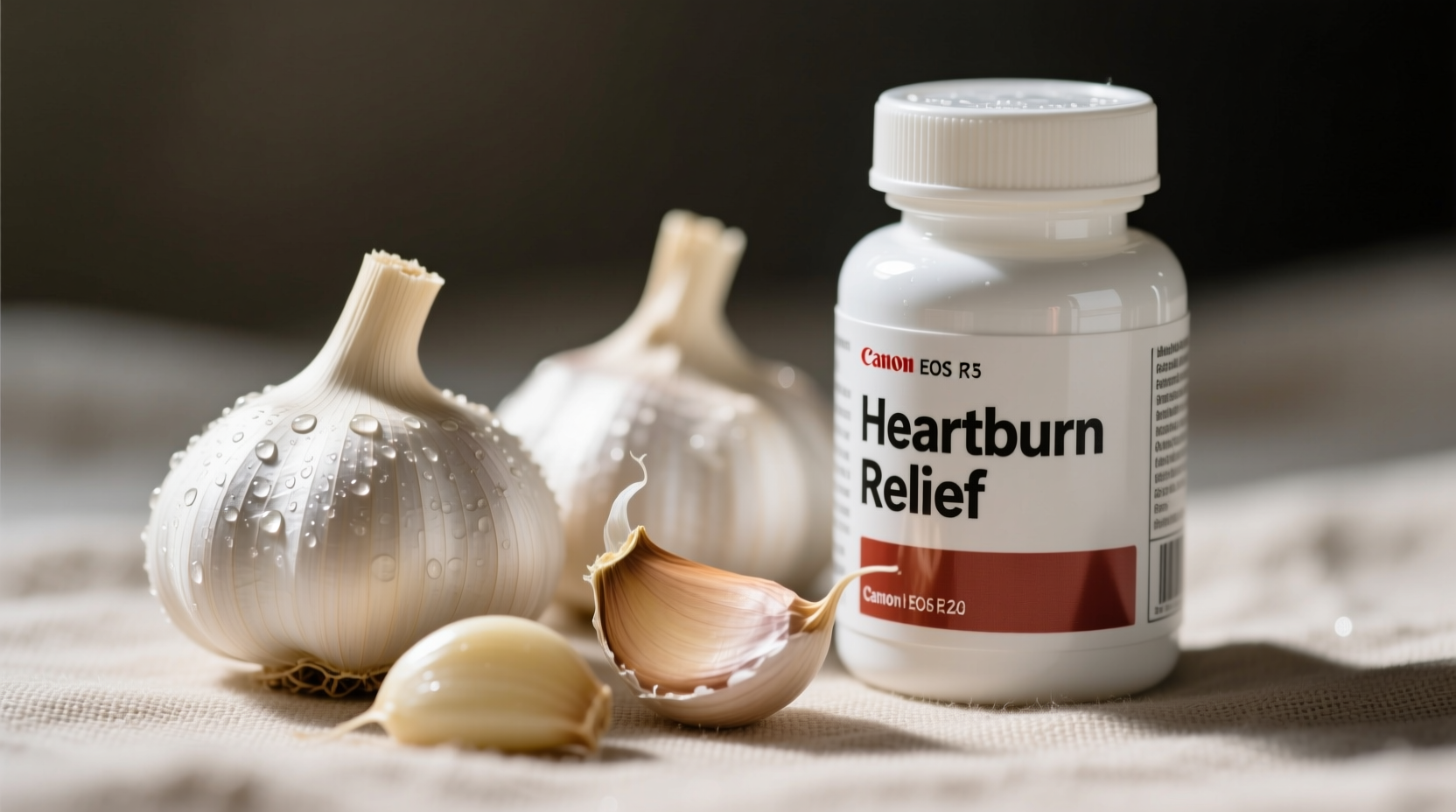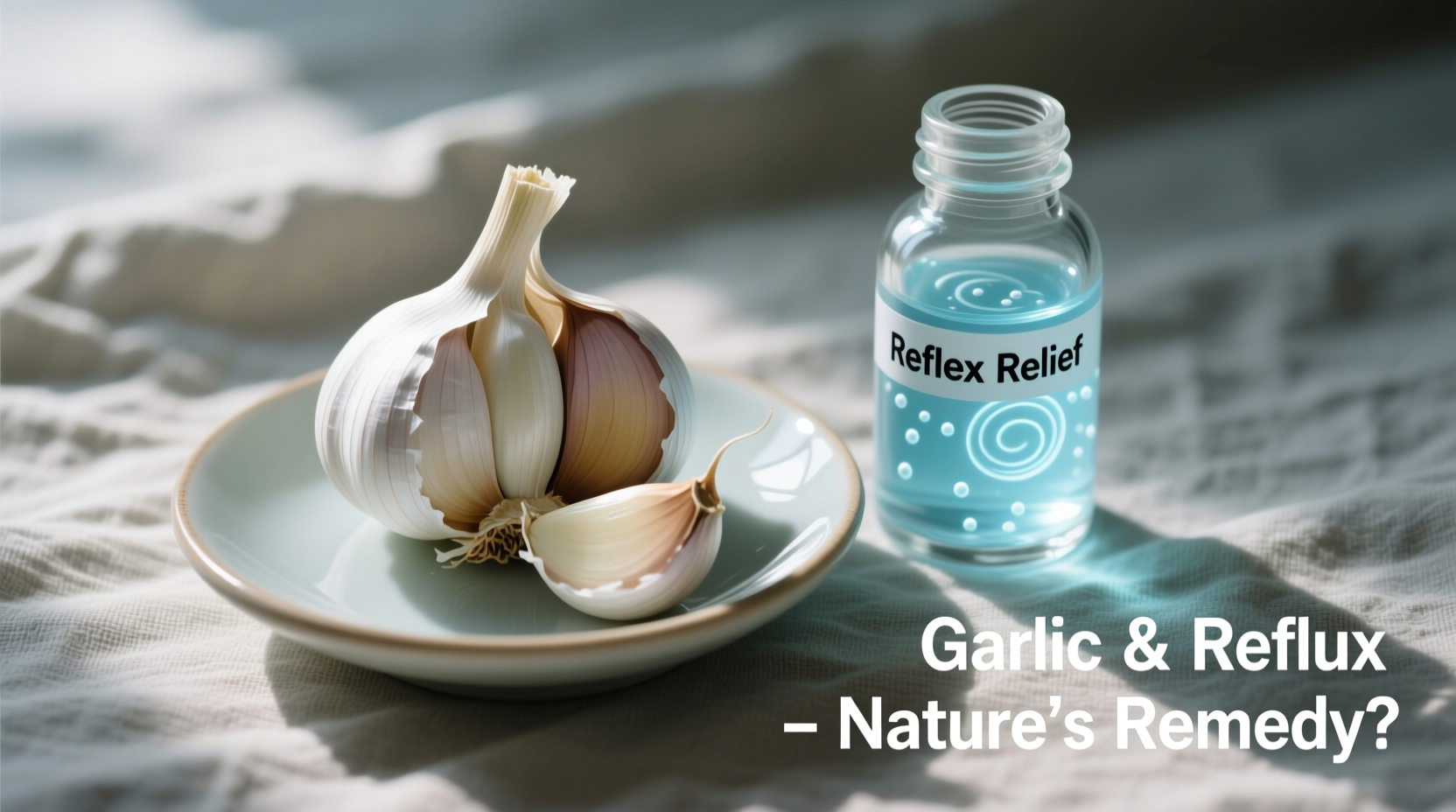Understanding Garlic's Impact on Acid Reflux
If you suffer from frequent heartburn, you've probably wondered whether garlic belongs in your diet. This common kitchen staple has complex effects on digestion that make it problematic for many with gastroesophageal reflux disease (GERD). Unlike some foods that universally trigger reflux, garlic's impact varies based on preparation method, quantity consumed, and individual sensitivity.
Why Garlic Triggers Reflux: The Science Explained
Garlic contains compounds that directly affect digestive processes. The primary culprit is allicin, which forms when garlic is crushed or chopped. Research published in the Journal of Neurogastroenterology and Motility shows allicin relaxes the lower esophageal sphincter (LES) - the muscular valve that prevents stomach contents from backing up into the esophagus.
When the LES weakens, stomach acid more easily flows upward, causing that familiar burning sensation. Additionally, garlic stimulates gastric acid secretion, creating a double threat for reflux sufferers. A clinical study from the National Institutes of Health found that participants with GERD experienced significantly more frequent and severe symptoms after consuming raw garlic compared to a control group.
| Garlic Preparation | Allicin Content | Reflux Risk Level | Recommended for GERD |
|---|---|---|---|
| Raw (crushed/chopped) | Very High | High | No |
| Sautéed | Moderate | Moderate-High | Limited |
| Roasted | Low | Moderate | Possibly |
| Black Garlic | Negligible | Low | Yes |
Individual Variability in Garlic Tolerance
Not everyone with reflux reacts the same way to garlic. According to data from the American College of Gastroenterology, approximately 72% of GERD patients report garlic as a trigger food, while 28% experience no issues with moderate consumption. This variation depends on several factors:
- Baseline symptom severity - Those with severe esophagitis typically have lower tolerance
- Medication use - PPI users may tolerate small garlic amounts better than those relying on antacids
- Consumption timing - Garlic eaten with large meals poses greater risk than when consumed with smaller portions
- Preparation method - As shown in our comparison table, cooking methods significantly alter garlic's impact
Practical Dietary Strategies for Garlic Lovers with Reflux
If you can't imagine cooking without garlic but struggle with reflux, these evidence-based approaches can help you find balance:
Smart Substitution Techniques
Replace raw garlic with milder alternatives that provide similar flavor profiles without triggering symptoms. Fennel seeds, asafetida (hing), and roasted shallots offer complex flavors with significantly lower reflux risk. The Mayo Clinic's GERD dietary guidelines specifically recommend these substitutions for maintaining flavor while managing symptoms.
Controlled Exposure Testing
Many people unnecessarily eliminate garlic completely. Instead, try this systematic approach:
- Eliminate all garlic for 2-3 weeks while tracking symptoms
- Reintroduce 1/8 teaspoon of roasted garlic in a small meal
- Wait 48 hours before increasing to 1/4 teaspoon
- Continue this gradual approach until you identify your personal tolerance threshold
This method, recommended by gastroenterologists at Johns Hopkins Medicine, helps determine whether you need complete avoidance or can enjoy limited amounts.
Strategic Meal Planning
When including garlic in your diet, timing matters. Consume garlic-containing meals at least 3-4 hours before lying down to allow proper digestion. Pair garlic with alkaline foods like leafy greens or cucumbers to help neutralize acidity. Avoid combining garlic with other common triggers like tomatoes, citrus, or fatty foods, which creates a "trigger stack" that significantly increases reflux risk.

When Garlic Might Actually Help Digestion
Interestingly, some research suggests black garlic - aged garlic with transformed compounds - may actually benefit digestive health. A 2022 study in Nutrients found that black garlic's unique fermentation process creates compounds that support gut microbiome balance without irritating the esophagus. While not a reflux treatment, this aged form represents the only garlic preparation that might be safely included in a GERD-friendly diet for most people.
Comprehensive Reflux Management Beyond Garlic
Managing reflux requires a holistic approach. While addressing garlic consumption is important, consider these evidence-based strategies:
- Maintain healthy body weight - excess abdominal fat increases pressure on the stomach
- Elevate the head of your bed 6-8 inches to prevent nighttime reflux
- Avoid eating within 3 hours of bedtime
- Identify and eliminate other personal trigger foods through systematic tracking
- Consider medical evaluation if symptoms occur twice weekly or interfere with daily life
Remember that dietary management works best alongside appropriate medical treatment. The American Gastroenterological Association emphasizes that while diet modifications help many people, they shouldn't replace necessary medical interventions for chronic GERD.
When to Consult a Healthcare Professional
Occasional heartburn is common, but certain symptoms warrant medical attention. Contact a healthcare provider if you experience:
- Reflux symptoms more than twice weekly
- Difficulty swallowing or painful swallowing
- Unintended weight loss
- Nighttime symptoms that disrupt sleep
- Symptoms persisting despite dietary changes
Chronic untreated GERD can lead to complications like esophagitis, Barrett's esophagus, or even esophageal cancer. Professional guidance ensures you receive appropriate treatment while making informed dietary choices.
Does roasted garlic cause less reflux than raw garlic?
Yes, roasted garlic generally causes less reflux than raw garlic. The roasting process breaks down allicin, the compound primarily responsible for relaxing the lower esophageal sphincter. While roasted garlic still contains some reflux-triggering compounds, it's significantly milder than raw garlic. Many reflux sufferers can tolerate small amounts of roasted garlic (about 1-2 cloves per meal) when consumed with other foods.
Can garlic supplements trigger acid reflux?
Yes, garlic supplements often trigger worse reflux symptoms than culinary garlic. Concentrated garlic pills deliver a high dose of active compounds without the buffering effect of food. Enteric-coated supplements may reduce but not eliminate this risk. If you take garlic supplements for health reasons but experience reflux, consult your healthcare provider about alternatives or proper timing (taking with a full meal may help).
What's the difference between garlic intolerance and garlic-triggered reflux?
Garlic-triggered reflux specifically involves stomach acid backing up into the esophagus, causing heartburn. Garlic intolerance typically involves digestive symptoms like bloating, gas, or diarrhea without the characteristic burning sensation in the chest. While both may occur together, they have different mechanisms - reflux relates to LES function while intolerance involves digestive enzyme deficiencies or gut microbiome reactions.
How long after eating garlic do reflux symptoms typically appear?
Reflux symptoms from garlic typically appear within 30-90 minutes after consumption, though this varies by individual. The timing depends on meal composition (fatty foods delay gastric emptying), quantity consumed, and personal sensitivity. Some people experience immediate burning, while others notice symptoms several hours later, particularly when lying down. Keeping a food-symptom journal helps identify your personal reaction timeline.
Is black garlic safe for people with acid reflux?
Black garlic is generally considered the safest garlic option for reflux sufferers. The aging process transforms allicin into less irritating compounds while creating new beneficial substances. Multiple studies, including research published in Nutrients journal, show black garlic doesn't relax the lower esophageal sphincter like regular garlic. Most people with mild to moderate GERD can enjoy small amounts of black garlic without triggering symptoms.











 浙公网安备
33010002000092号
浙公网安备
33010002000092号 浙B2-20120091-4
浙B2-20120091-4